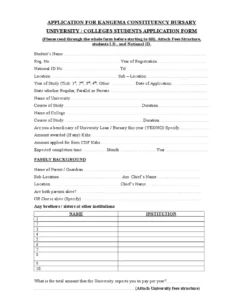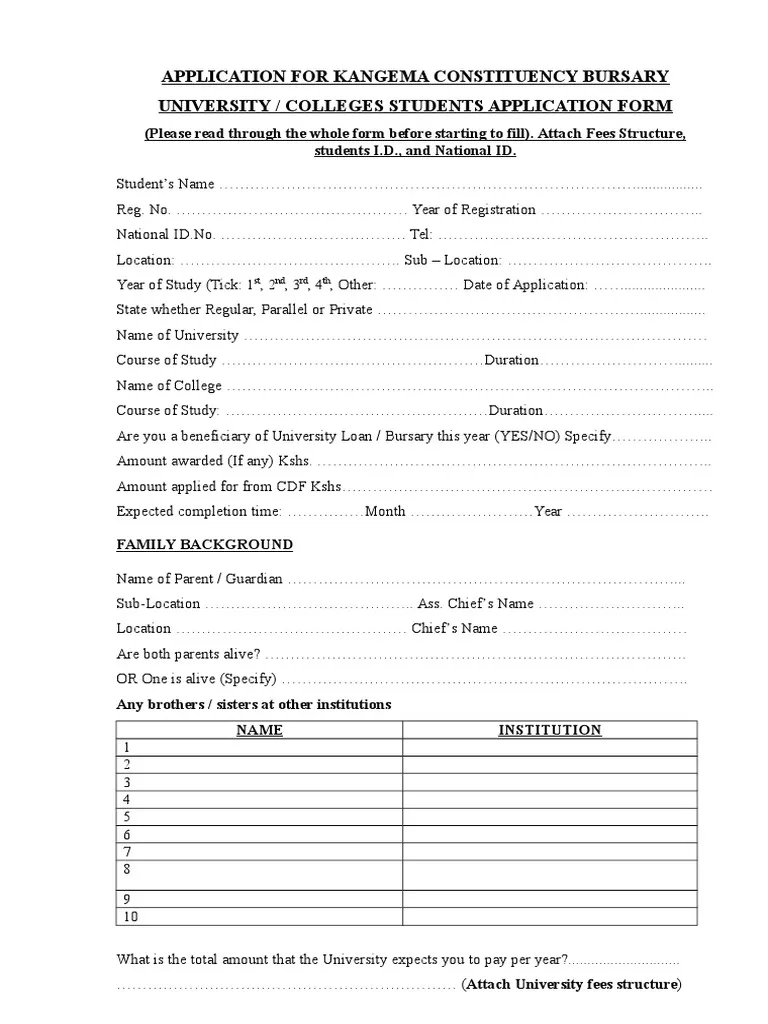A Step-by-Step Guide to Applying for University Bursaries
For top-performing Nigerian students from financially constrained backgrounds, bursaries provide crucial funding to access quality higher education. However, bursaries don’t just land in your lap – you need to proactively apply for them. Follow this comprehensive 10-step guide to master the art of applying for university bursaries within the SA context.

ALSO SEE:
How To Apply For A Bursary While In Grade 11, 12
Skills To Put On A Resume For Banking (According to Experts)
Sol Plaatje University (SPU Online Application: How To Register)
Bursaries for 2024 Undergraduate South Africa – Funding Your Education
Learn How to Secure a Full Bursary in South Africa – Step-by-Step Guide
Step 1: Start Researching Bursary Options Early
Don’t wait until your final year of secondary school to start thinking about bursaries! Begin exploring bursary opportunities at least 1-2 years before you intend on starting your undergraduate degree. Here are some useful places to find info on available bursaries:
- Your school career advisor – Ask them which bursaries past students have successfully secured.
- University websites – Most have a financial aid office listing bursaries for current and prospective students.
- Federal Ministry of Education website – Lists government bursary schemes like the Bilateral Education Agreement (BEA) Scholarships.
- Scholarship and Bursary Secretariat website – Provides info on available national bursary programs.
- Independent scholarship databases – Websites like Scholarships.com and Fastweb allow you to search for bursaries by criteria.
- Corporate organizations’ websites – Many companies offer bursaries, especially in scarce skills areas.
Cast your net wide to understand the full range of potential bursaries available to target.
Step 2: Define Your Bursary Goals
With so many bursaries available, it helps to narrow your focus. Consider what you want to gain from a bursary:
- Full funding of tuition, accommodation and books? Or partial funding to supplement other funding?
- Merit-based support for excellent grades? Or need-based assistance for disadvantaged students?
- Guaranteed employment after graduation? Or freedom to choose where you work?
- Bursaries for scarce skills like engineering? Or humanities and social sciences?
Having clear bursary goals allows you to find programs that are the best fit for your unique situation and future aspirations.
Step 3: Research the Requirements Thoroughly
Once you’ve identified potential bursaries, dig deeper into the specific requirements and eligibility criteria for each one. Key details to check are:
Academic Criteria
- Minimum entry grades and subject requirements
- Specific grade thresholds and GPAs required
- Academic performance renewal requirements
Financial Criteria
- Gross family income thresholds
- Required financial statements
Other Eligibility Factors
- Field of study limitations
- Nigerian citizenship requirements
- Gender, age or ethnicity restrictions
- Geographical limitations
- Full-time or part-time study limitations
Step 4: Evaluate Your Eligibility
With the requirements clarified, conduct an honest self-assessment of your eligibility.
- Do your grades meet the thresholds stipulated?
- Does your household income fall within specified brackets?
- Do you meet all other stipulated criteria like gender, age, residence etc?
If your profile doesn’t quite match the bursary specifications, reconsider your options and find more suitable programs to target.
Step 5: Prepare Your Application Materials
Meticulous preparation of documents gives you an edge. Start compiling:
1. Academic Records
- WAEC/NECO results
- Any post-secondary academic results
- School transcripts from Form 1 onwards
- Certified copies are required, not originals
2. Identity Documents
- Certified copy of passport or national ID card
- Certified copy of both parents’ IDs
- Birth certificate
3. Income Proofs
- Parents’ recent pay slips or tax records
- Pension statements if retired
- Sworn affidavit declaring unemployment if applicable
4. Other Relevant Documents
- Traditional ruler’s attestation letter
- Disability assessment report if needed
- Death certificates if applicable
Thorough preparation prevents last minute panicked scrambling!
Step 6: Draft a Strong Motivation Letter
A compelling motivation letter can make or break your bursary application. Points to cover include:
- Background about yourself and your family/community
- Challenges you’ve overcome and key achievements so far
- Your chosen degree, university and career goals
- How the bursary will enable you to uplift your community in future
- Skills, strengths and qualities that make you an ideal candidate
- Why you deserve the bursary more than other applicants
Put time into crafting a thoughtful, engaging letter that brings your application and background to life.
Step 7: Get Great Reference Letters
Most bursaries require 1-2 letters vouching for your character and potential. Identify teachers, religious leaders, traditional rulers or volunteer coordinators who:
- Know you well enough to provide personalized insight
- Can speak to your strengths both academically and beyond the classroom
- Are credible sources the bursary adjudicators will recognize and respect
- Have unequivocally positive things to say about you
Give them adequate time to prepare letters reinforcing why you merit the bursary.
Step 8: Submit Your Application Correctly
Follow all instructions meticulously! Applications are usually either:
- Online via portals on the bursary provider’s website
- Physical couriered or hand submissions
For online applications:
- Scan or photograph all documents clearly
- Upload the application plus supporting docs
- Keep copies of everything
For physical applications:
- Print sufficient copies of all documents
- Assemble documents neatly with a list of contents
- Address and submit to relevant office before deadline
Step 9: Prepare for Interviews
Being shortlisted for bursary interviews means you’ve passed the first test! Interviews allow the panel to assess you beyond just paper applications. To shine:
- Dress professionally in formal attire
- Thoroughly research the organization and bursary before the interview
- Practice responses to standard interview questions
- Prepare a short personal pitch highlighting your strengths
- Be confident but remain humble – let your achievements speak for themselves
- Ask smart questions that show your engagement and interest
The personal touch of interviews gives you a chance to bring your dedication and potential to life.
Step 10: Follow Up Appropriately
Waiting post-application can be frustrating. Avoid harassing the bursary provider, but do follow up politely after the indicated period if you have not received any communication about your application status. Call or email to:
- Confirm if they received your complete application
- Check if any further information is needed from you
- Enquire politely as to the status of your application
- Ask when you can expect to be notified of the outcome
If awarded the bursary, promptly accept and complete any paperwork required. Remember to uphold any obligations like maintaining academic performance and committing to a post-graduation employment period if required by the bursary provider.
Conclusion
Applying for bursaries requires dedication, planning and attention to detail. But the rewards are immense if you secure funding that enables access to quality higher education and career development. Follow these steps closely to master the art of applying for university bursaries within the Nigerian context.
FAQs
How many bursary applications should I submit per year?
Aim for 5-10 good quality applications tailored to bursaries you are eligible for and passionate about. Cast a wide but targeted net.
When is the best time to apply for university bursaries in Nigeria?
Most open applications around May-July for the next academic year. But start preparing documents and researching much earlier.
Can I submit the same bursary application to multiple providers?
No, customize and tailor each application to respond to what every specific bursary provider is looking for.
If I don’t get the bursary this year, can I reapply next year?
Yes, you can continue applying for bursaries every year of your undergraduate degree as long as you meet the eligibility criteria.
Do I need to have secured admission already before applying for bursaries?
No, you can apply before getting admission but will need to provide proof of admission later if provisionally awarded a bursary.
If I accept one bursary, can I still apply for others at the same university?
Yes, but notify your current bursary provider and check if any restrictions apply for applying elsewhere.

